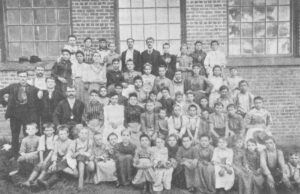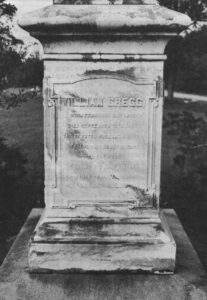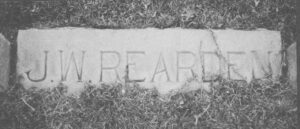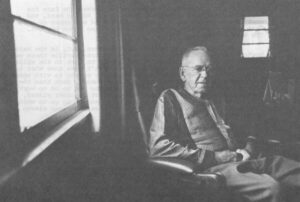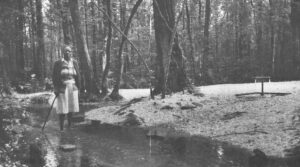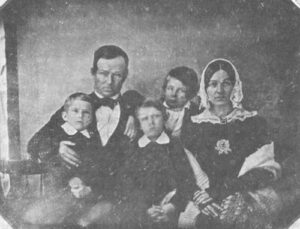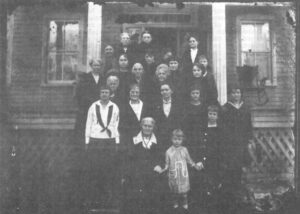Start from the river at Augusta, the Savannah with its slow churning delta batter of tidewater mud and mosquito larvae, and cross it into South Carolina. You’ll find yourself at the mouth of a small creek that for twelve miles has cut a deep valley into the surrounding Appalachian plateau. Horse Creek Valley or simply the Valley as it’s known to its more than 20,000 inhabitants is, like the Merrimack Valley in New England, one of this country’s early industrial cradles, spawning grounds for a new system of production that was by the turn of the century to have transformed and shaped an entire nation.
Near the mouth of Horse Creek, quietly secluded among the blue granite hills which are its namesake, lies a town called Graniteville, presiding like some ancient tribal patriarch over the industrial watershed below. Historians may quarrel about whether Graniteville’s longstanding reputation as the South’s “first great cotton mill” is entirely deserved, but nobody since its inception in 1845 has disputed the fact that this tiny isolated community of one hundred cottages and a granite factory in the backwoods of South Carolina was one of the most remarkable industrial experiments in the annals of the South.
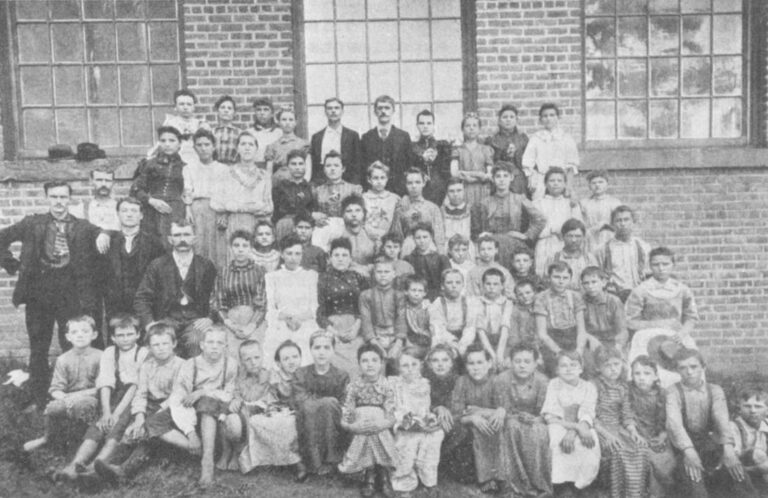
Graniteville is what’s known as a mill village, an industrial community made up of small identical row houses planned and built by a textile company to house the factory operatives who work in the mill that forms its center. In Graniteville as well as in most of the mill villages that followed it, the name of the company and the name of the village were the same because the two were in fact indistinguishable. The company was the village. The company created it from nothing, brought in the people from the surrounding hills and countryside, rented them their houses, sold them provisions, built them churches, and hired preachers and schoolmasters to discipline and educate their families to the new “systematic habits of industry” required for work in a textile factory.
Today Graniteville is over a century and a quarter old. The wave of cotton mills spawned by Graniteville’s example which during the 1880’s swept across the nation’s southeastern states with a kind of evangelical fervor had by the 1950’s virtually wiped out the great textile cities of New England and had precipitated a southward migration of textile factories that would in the next two decades economically decimate a significant proportion of the industrial output of the entire Northeast. The Graniteville Company itself mushroomed from a single mill with 325 employees valued at $300,000 to a complex of 12 plants spanning two states, employing 6,900 people and with a net worth of over $63 million.
And yet beyond the company parking lots and computer center, the original village for the most part is still standing today with its hand-hewn granite mill all but hidden from view, encased completely like some ancient icon within the plant additions and expansions that it spawned. So that as you descend the rampway from the interstate into the narrow upper reaches of the valley with its sandhill slopes of long-leaf pine and mountain laurel, you may be struck by a strange sense of having passed through some invisible barrier into a hermetically sealed chamber–a sort of industrial terrarium lost in some tiny backwoods valley, whose stillness is the stillness of the bell jar and whose looms like vast seismographic instruments trace hieroglyphs of finely woven cloth that speak of movements of the earth invisible to the eye.
II. Two Excerpts from a Screenplay.
During the past months, novelist Cormac McCarthy (The Orchard Keeper, Outer Dark, and Child of God) and I have been working together on a screenplay for a film that would be a fictional dramatization of some of the early years of Graniteville, focusing specifically on the strange circumstances surrounding the murder of James Gregg at a stockholders’ meeting in April of 1876. James was the son of William Gregg, the founder of Graniteville, and his murderer–a village boy by the name of Robert McEvoy–was tried and hung without ever giving an explanation for the incident. In the years that followed, Bob McEvoy was to become a kind of folk hero to the mill people of Graniteville. Bob had been crippled with the loss of one leg as a young child and, after working for a period as an office boy for the company, had left town and disappeared for almost two years.
1876. Winter evening. Train arriving at the outskirts of Graniteville. A solitary figure riding the last boxcar. The train slows, Robert McEvoy sits atop the boxcar with his crutch and a tattered carpetbag. He surveys the countryside. He is chewing tobacco and he squints and leans and spits over the edge of the car roof. He is older and harder looking and he wears a scar. As the train grinds to a halt he takes up his bag and moves along the roof to the ladder and lowers himself down to the ground and sets off along a narrow road through the winter woods. In the distance the mill bell tolls.
At the top of a hill he meets two blacks seated by the side of the road taking their dinner from pails. They are dressed in rags of overalls. McEvoy stands before them and looks down at them. Behind them is a lane leading into the graveyard and tombstones rise out of the winter grass and weeds. They look up at McEvoy.
First Black: You wants to take dinner with us you gots to ast. I ain’t goin to ast you. You liable to shoot me.
McEvoy: What are you all doin up here?
Second Black: We takin our dinner. When that bell ring down there for folks to quit and take they dinner it ring for us too.
The first black waits for him to finish, then answers McEvoy’s question.
First Black: We diggin a grave. I don’t like to eat my dinner in there. He don’t care, but I does.
Second Black: Them folks in there don’t care. No more’n you would.
First Black: Everybody that ain’t got a say so, don’t mean they don’t care. In this life or out of it.
He looks up at McEvoy.
First Black: Is you new to these parts?
McEvoy: Who’s grave you diggin?
Second Black: Some old woman that died.
First Black: A lady in the town. Don’t know her name. She ain’t got no kinfolk buried here.
A wind blows dead leaves over the road. McEvoy raises up and looks past the seated blacks toward the stones.
Second Black: Her husband give us two dollar. We supposed to get paid from Mr. Evans but he said not to take his money and he give us two dollar.
McEvoy: You don’t know her name?
First Black: No suh.
Second Black: He was up here most of the mornin…
First Black looks at the second nervously, and at McEvoy.
Second Black: Went all around takin up the old dead flowers off folks’ graves…
First Black: Odell…
Second Black: Said folks ought not to bring flowers if they wasn’t fixin to come back.
McEvoy stares down at the blacks. They look nervous. He hobbles past them down the little lane into the graveyard. They watch him go with wide eyes. In a few minutes he returns. He has their pick and shovel under his arm and he drops these in the road in front of them.
McEvoy You all eat your dinner and get back on down to wherever you started from. That woman’s not to be buried up here. She don’t belong to the mill.
Second Black: We gots to work to suit the man what pays us. You don’t want that grave dug you see him.
First Black: Hush Odell.
McEvoy leans toward the second black.
McEvoy: You get your shit and get gone. I see you up here again diggin I’ll blow a hole in your black ass.
Second Black: Yessuh, I didnt mean nothin by it. I was just doin like I was told…
First Black: Will you hush now, Odell? Will you?
McEvoy steps back and the two gather up their pails and their half eaten dinners and scrabble up the picks and shovels and start off down the road half sideways, nervously watching McEvoy.
First Black: I knowed when I seen you you was trouble.
They turn and go on down the road, arguing among themselves. McEvoy watches them go.
Interior, afternoon, the McEvoy house. The mirrors in the house are covered with cloths and in the front room is a dark wood coffin trestled up on sawhorses wrapped in black crepe. The coffin is open and there is a lighted candle on a table and there are three old ladies in black mourning. Two are sitting in chairs and the third is arranging flowers in a vase. Robert McEvoy appears in the door and they all turn to look at him. He ignores them and comes into the parlor and goes to the coffin and looks down at his dead mother. The woman arranging the flowers has stopped and watches him . The other two turn and whisper and the first one looks at McEvoy with disapproval and rises and goes to the door and shuts it. At the sound of the door shutting McEvoy turns and looks at the old woman.
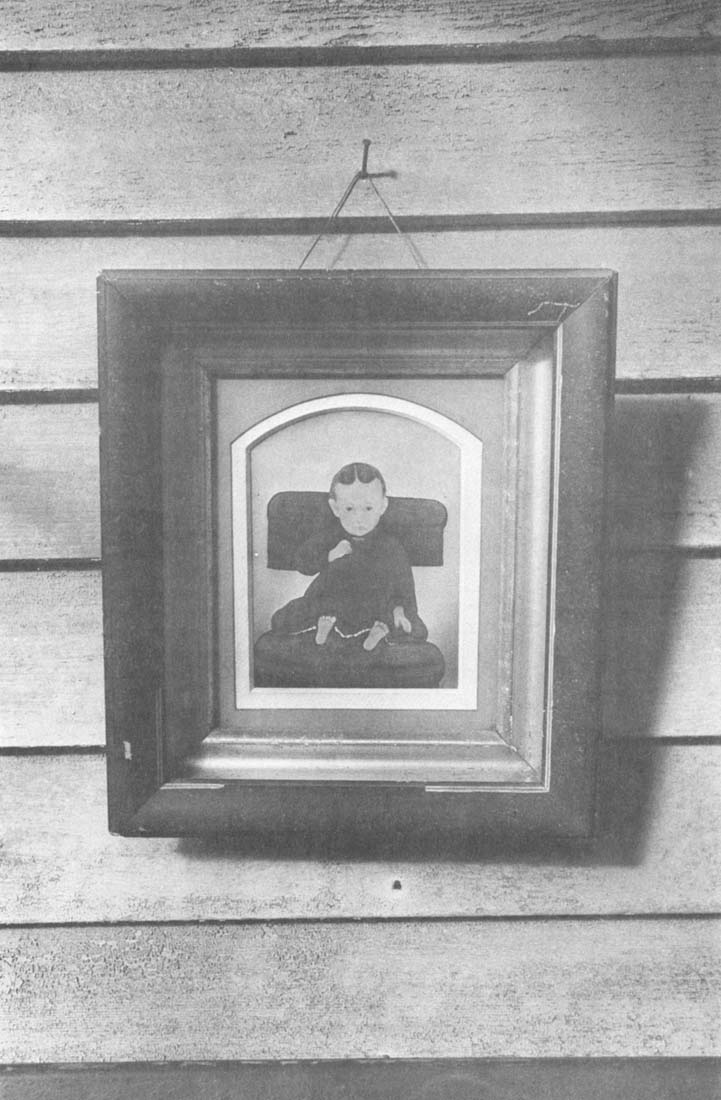
McEvoy: Where’s the old man?
No one answers.
McEvoy: Where’s Martha?
They regard him nervously and he turns and goes on through the house, looking in rooms.
McEvoy: Hey.
He returns to the front room. He looks at the old women.
McEvoy: You all get out. I don’t know you.
Old Woman: We caint leave. We give word to set up with her.
McEvoy: I want you out.
The old women regard each other. The two seated are nervous, are ready to rise and leave. The one standing sets her jaw. When McEvoy sees her he flies into a rage. He hobbles to the door and flings it open and screams at them.
McEvoy: Get out! Out, damn it!
The two seated ones rise and scurry past and out the door. The other takes a last long look at the coffin and giving McEvoy a hard look she goes past him. Outside she turns as if she’d say something to him but he slams the door in her face. The wind from the door sets the candle a guttering. McEvoy goes to the casket and looks down. He takes the coffin lid up from behind the box and fits it over the top of the coffin and then he leans on the coffin and lets his head fall forward onto his clasped fists.
The McEvoy parlor, darkness outside, the only light the candle which is now burned down low. McEvoy is sitting in one of the chairs with his hands folded in his lap. The door opens and Martha (his sister) enters. She comes forward and kneels in front of him.
Martha: Bobby?
McEvoy: When did she die?
Martha: Yesterday. Early of a mornin.
There is a long moment of silence.
Martha: You got the letter?
McEvoy takes a crumpled letter from his shirt pocket. He smoothes it absently and looks at it.
Martha: I know you come quick as you could.
He looks down at her. He looks at the letter.
McEvoy: I wish you hated this place like I do.
He shakes his head.
McEvoy: No. I don’t.
Martha: Did you want me to fix you some supper?
He shakes his head no.
McEvoy: She was supposed to been took back up home.
Martha: It’s all right.
McEvoy: No it ain’t.
Martha: It’s done been arranged, Bobby. For her here.
McEvoy: She ain’t goin to be buried here.
Martha: What do you aim to do?
McEvoy: He’s got the money. He could of took her up there on the train.
Martha: He cant stand it, Bobby. He’s just tore up…
McEvoy: Where’s he at?
Martha: We went up there last year. He and Mama. We seen our old place up at Pickens and we went to Greenville and I seen Captain, Bobby. He was harnessed to a wagon in the street and he knowed me, Bobby. And we was up there three days.
McEvoy: Where’s he at?
Martha: I don’t know. I sent Maryellen up to Clabo’s. He wouldn’t have her buried today. He said give Aunt Fern and them time to get down here but they ain’t comin. Bobby, I know they ain’t. I prayed ever day for you to get my letter. From the time she first took sick…
McEvoy: When trouble once finds a house it stays on. You caint get shed of it.
Martha: Don’t be that way Bobby.
McEvoy: What way am I?
She looks down. She doesn’t answer.
McEvoy: You don’t know how I am. You don’t know me.
Martha: You’re still my brother.
McEvoy: The good book says all men are brothers but it don’t seem to cut no ice, does it?
Night, interior, lamplight, an old barn used as a doggery for drinkers and card players. In the background are six or eight men seated about a spread army blanket playing tong. To one side in the background is a circular enclosure nailed up of boards about two feet in height and twenty feet in diameter. There are a number of dead chickens about and a cat is feeding on the head of one of them. In the foreground is a stove glowing red. Four men seated about it in old bottomless chairs and on crates. A large man named Pinky is in charge and from time to time he will go to the game to take a house cut. The players bid and talk. The men about the stove pass a jar of white whiskey around and pass after it a peeled raw potato from which they take bites to chase the whiskey.
Exterior. The barn in the dark with the slats lit and McEvoy hobbling toward it through the windy weeds until he reaches the door and pushes against it. A chain rattles. He raps at the door.
Interior, barn. Pinky rising to go to the door. He undoes the chain and opens the door and McEvoy is standing there.
Pinky: Well looky here.
The men at the stove are looking at the door to see who is here. McEvoy enters. He pauses to wipe his nose on his sleeve and he looks about. Pinky re-chains the door behind him.
Pinky: Thought you’d quit these parts, young buddy.
Pinky is coming back toward the stove. McEvoy is standing somewhat uneasily to one side.
McEvoy: My mama died.
Pinky: Well honey I didn’t know that. Come here and set and get ye a drink. I’m sorry to hear it.
McEvoy: I thought the old man might of come up here.
Pinky: Pat?
Pinky shakes his head. McEvoy looks to the other men about the stove but they look down, look dubious.
First Man: Get ye a chair there. Get over here and warm.
McEvoy looks about. There is a peach crate to one side. He looks at the men gathered about the stove. Pinky opens the stove door and hefts a chunk of wood through and spits after it and clanks the door shut and wiping his mouth on his sleeve looks toward McEvoy, squinting.
Pinky: Come up son. Ain’t no need to be a stranger.
McEvoy hobbles over to the crate and gets it and sets it by the stove and leans his crutches back and sits and rubs his hands together at the warmth. The men watch him and he watches the stove.
First Man: Give that man a drink of whiskey, Ed.
The whiskey is passed to McEvoy and he holds it up to the light of the lamp and gives it a shake to check the bead and unscrews the lid and tilts it and takes a drink. He lowers the jar and looks at the men and swallows and blows, He takes the knife and potato offered him and slices off a piece and eats it and replaces the jar lid and passes the jar and the potato back.
The second man leans forward and looks at McEvoy, somewhat suspiciously, as if he doesn’t expect the truth.
Second Man: What all did she die of?
McEvoy: Malaria Fever.
Second man: Funny time of year to die of that.
McEvoy: She took sick back two months ago. I come quick as I heard but she died fore I got here.
Pinky: When did she die, honey?
McEvoy: Yesterday morning.
First Man: Well leastways ye got here for the buryin. They ain’t buried her have they?
McEvoy shakes his head no. He sits slumped. He is weary.
Pinky: Here Ed, let’s see a little of that muleshoe.
He takes the jar and unscrews the cap and drinks and hands the jar to McEvoy.
Pinky: Here, honey. Get ye a drink, Ed. Let’s see that tater here.
McEvoy takes the jar and drinks and passes it back.
Pinky: You all are all about growed ain’t ye? I mean, they ain’t no babies at home.
McEvoy: Maryellen’s the least’n. She’s eleven.
Pinky: It’s hard when they leave young’uns. A man caint raise em. My sister died left five and the oldest’n not started school. We had to hunt homes for em. They done all right. But it was hard.
First Man: You tell your daddy we was sorry as we could be.
Pinky: A finer son of a bitch never wore shoe leather. Let’s have a little old drink Ed.
The jar is passed around.
First Man: You back to stay are ye?
McEvoy: I don’t know.
First Man: Reckon you seen a right smart of the world since you left out of here.
McEvoy: Some.
Pinky: It’s kindly slack times here. Reckon it is everwheres.
First Man: You reckon to get on at the mill?
McEvoy: I ain’t lost nothing down there.
Pinky: I hear ye. Only way to get ahead down there is to get your wife knocked up by the boss. Give ye a little leverage.
Second Man: Talkin about people dyin…
McEvoy: I better get on, I reckon.
Second Man: Talkin about people dyin they found another old boy dead in the woods down towards Vaucluse. Speculate the “n…..”s got him.
McEvoy: I best get on, I got to hunt the old man.
McEvoy does not rise nor move.
First Man: Most likely he’d been at church this evenin wouldn’t he? Wife dead and all.
Pinky: Ain’t no catholic church in Graniteville.
First Man: Well now that is right. I forgot about him bein Catholic.
Pinky: You won’t find him carryin on in no Amen corner will ye son?
McEvoy shakes his head no. He looks toward the Tong game.
McEvoy: I better get on and hunt him.
Pinky: Just jump in that Tong game there why don’t ye. Get ye feet wet.
McEvoy: I ain’t never played.
First Man: Lord, don’t let em hear that. They’ll be over here a courtin ye.
Second Man: Had his throat cut, they said. Reckoned it to of been the “n…..”s.
Second man spits against the stove.
First Man: Where’d that jug get to?
The third man, who has not spoken, reaches down alongside the crate where he is sitting and fetches up the jar and holds it to the light and passes it on. They drink. Pinky takes the potato with the knife stuck in it and cuts the remaining piece in two and passes one slice to McEvoy and eats the other and takes a new potato from the bib of his overalls and falls to peeling it. He shakes his head slowly.
Pinky: Lord don’t they hate whisky over to that mill.
First Man: They hate for you to drink it. That ain’t sayin they wont take a drink their own selves.
Pinky: The old man would by god not take one.
First Man: No. You right about that.
Pinky: I guarangoddamntee ye.
First Man: What about James?
Pinky: That son of a bitch will take a drink.
The jar comes around to the second man. He takes it and shakes his head.
Second Man: Never thought I’d live to see the day. “N…..”s runnin crazy killin folks. Right in ye own country.
He drinks.
Pinky: Don’t get him started on the “n…..”s, for God’s sake.
Second man slices potato and eats and passes the jar on to the third man. Third man takes jar.
Third Man: Thing about James. He never did want to put the jam on the lower shelf where the little man could get some.
First Man: Get ye a little old drink there, Housecat.
Third Man: They’s plenty of rhubarb all around the farm.
And another little drink won’t do us any harm.
Night exterior, Robert McEvoy drunk staggering through a field.
McEvoy on a narrow country road, reeling along on his crutch. He pauses to rest, leaning against a barn. He listens to the silence. A few dogs bark in the distance. He goes on. There is a horse leaning over a fence and he and the horse look at each other and McEvoy moves on.
McEvoy hobbling up the road to Graniteville. He has passed a few houses and now several dogs have come into the road behind him and circle to pick up his scent and howl. They are seen by the light of a lamp in the window and their hackles are up and they howl after McEvoy who wobbles on into the darkness.
November 19, 1975
©1975 Richard Pearce
Richard Pearce, a freelance film-maker/journalist, is an Alicia Patterson Foundation award winner. This article may be published with credit to Mr. Pearce and the Alicia Patterson Foundation.

